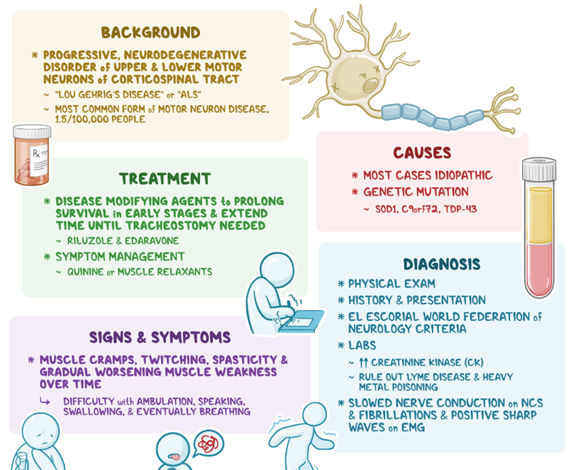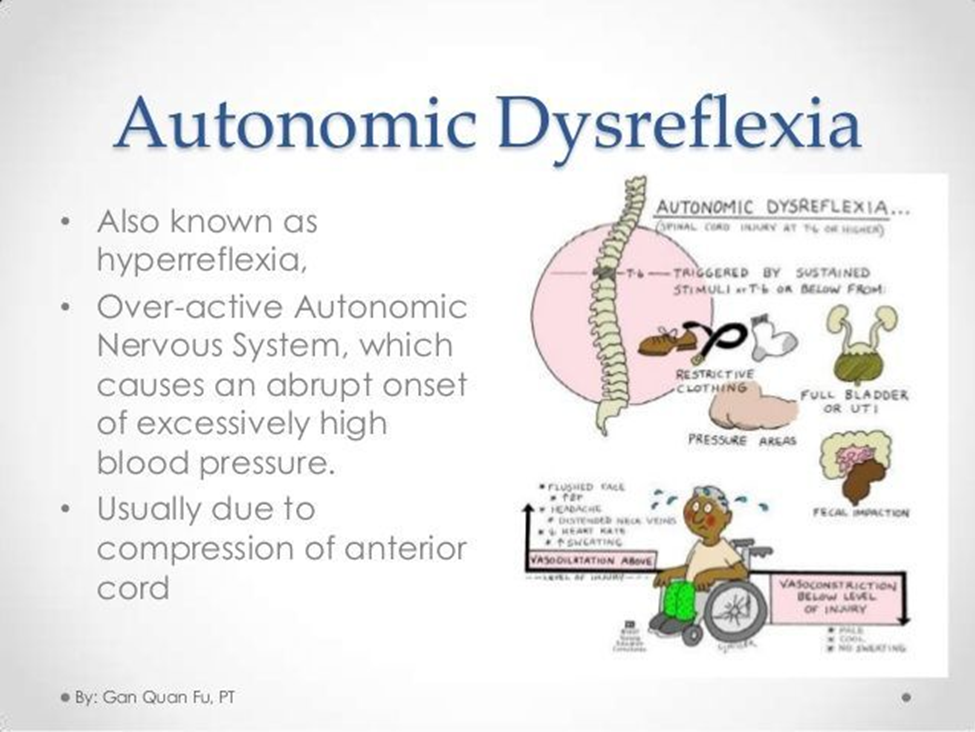Which reason explains why a patient with amyotrophic lateral sclerosis (ALS) is uniquely prone to depression?
Intellectual capacity is not affected.
Communication is altered.
Mobility is limited.
Nutritional intake is poor.
The Correct Answer is B
A. Intellectual capacity is not affected:
This statement refers to the fact that ALS primarily affects motor neurons, leading to muscle weakness and paralysis, but it typically does not directly impact cognitive function or intellectual capacity. While cognitive impairment is not a hallmark feature of ALS, some individuals may experience changes in cognitive function or behavior, such as executive dysfunction or frontotemporal dementia, in later stages of the disease. However, depression in ALS is not primarily linked to changes in intellectual capacity but rather to other factors such as altered communication, physical limitations, and loss of autonomy.
B. Communication is altered:
ALS can affect the muscles involved in speech and swallowing, leading to difficulties in communicationAs the disease progresses, patients may experience dysarthria (difficulty speaking clearly) and dysphagia (difficulty swallowing), which can impair their ability to communicate effectively with others. Altered communication can result in frustration, social isolation, and feelings of being misunderstood, all of which are risk factors for depression.
C. Mobility is limited:
ALS causes progressive muscle weakness and paralysis, which can significantly impair mobility over time. As the disease advances, individuals with ALS may become increasingly dependent on mobility aids such as wheelchairs or may require assistance with mobility tasks. Limited mobility can lead to feelings of loss of independence, decreased participation in activities, and increased dependence on caregivers, all of which can contribute to depression.
D. Nutritional intake is poor:
ALS can affect the muscles involved in swallowing and chewing, leading to difficulties with eating and drinking. Dysphagia, or difficulty swallowing, is a common symptom in ALS and can result in poor nutritional intake and weight loss. Malnutrition and weight loss are associated with increased morbidity and mortality in ALS, and they can also contribute to feelings of weakness, fatigue, and overall decline in quality of life, which may exacerbate depression.

Nursing Test Bank
Naxlex Comprehensive Predictor Exams
Related Questions
Correct Answer is B
Explanation
A. Insert a padded tongue blade into the client's mouth.
This intervention is not recommended. Placing any object, including a padded tongue blade, into the mouth of someone experiencing a seizure poses a risk of injury, such as biting the tongue or breaking teeth. It can also obstruct the airway and increase the risk of aspiration. Therefore, inserting anything into the client's mouth during a seizure is contraindicated.
B. Place a pillow under the client's head.
Placing a pillow under the client's head can help prevent head injury by providing cushioning and support. It can also help maintain the client's airway and reduce the risk of aspiration. Therefore, this intervention is appropriate and helps ensure the client's safety during the seizure.
C. Gently restrain the client's extremities.
Restraining the client's extremities is not recommended during a seizure. It can increase the risk of injury, such as fractures or dislocations, and may exacerbate muscle contractions. It's important to allow the client's movements to occur naturally while taking measures to ensure their safety, such as removing nearby objects and providing a safe environment.
D. Keep the client in a supine position.
It is essential to ensure that the client's head is turned to the side (recovery position) to prevent aspiration and allow for drainage of oral secretions. Additionally, the nurse should remove any nearby objects that could pose a risk of injury during the seizure.
Correct Answer is C
Explanation
A. Check the client for a fecal impaction.
This intervention is important for managing autonomic dysreflexia because a fecal impaction can trigger autonomic dysreflexia by causing rectal distention. However, it is not the first action the nurse should take. Promptly addressing the immediate cause of autonomic dysreflexia is crucial to prevent complications.
B. Ensure the room temperature is warm.
This intervention is important for maintaining the client's comfort and preventing temperature-related complications. However, it is not the first action the nurse should take when suspecting autonomic dysreflexia. Immediate interventions to address the underlying cause of autonomic dysreflexia are necessary to prevent serious complications such as stroke or seizure.
C. Check the client's bladder for distention.
This is the correct action to take first. Bladder distention is one of the most common triggers of autonomic dysreflexia in individuals with spinal cord injuries. A distended bladder stimulates autonomic reflexes, leading to a sudden increase in blood pressure. Therefore, the nurse should assess the client's bladder for distention and initiate appropriate interventions such as catheterization to relieve urinary retention.
D. Raise the head of the bed.
While elevating the head of the bed can help reduce blood pressure in some situations, it is not the first action the nurse should take when suspecting autonomic dysreflexia. Elevating the head of the bed may exacerbate autonomic dysreflexia by increasing venous return and blood pressure. Therefore, addressing the underlying cause of autonomic dysreflexia, such as bladder distention, takes priority.

Whether you are a student looking to ace your exams or a practicing nurse seeking to enhance your expertise , our nursing education contents will empower you with the confidence and competence to make a difference in the lives of patients and become a respected leader in the healthcare field.
Visit Naxlex, invest in your future and unlock endless possibilities with our unparalleled nursing education contents today
Report Wrong Answer on the Current Question
Do you disagree with the answer? If yes, what is your expected answer? Explain.
Kindly be descriptive with the issue you are facing.
